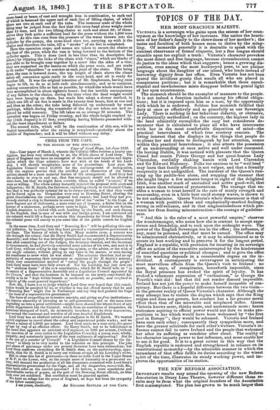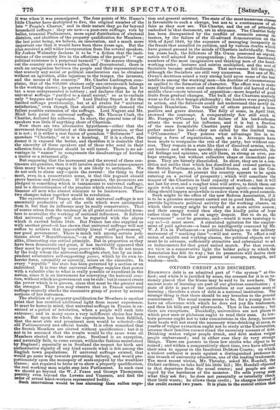THE NEW REFORM ASSOCIATION.
IMPORTANT results may attend the opening of the new Reform Association in Drury Lane Theatre, however different those re- sults may be from what the original founders of the Association first contemplated. The plan has grown to be much larger than. It was whenit was promulgated. The four points of Mr. Hume's little Charter have multiplied to five, the original number of the late "People's Charter," and in their nature they go far beyond household suffrage : they are now—a poor-rate suffrage, vote by ballot, triennial Parliaments, more equal distribution of electoral districts, and abolition of the property qualification for Members ; the last point being, we believe, an innovation, and a much more important one than it would have been three years ago. But the plan received a still wider interpretation from the several speakers. Sir Joshua Walmsley declares it to be "a fiction that the insti- tutions of the country live in the affections of the people" : "our political existence is a perpetual turmoil "; "the masses through- out the country are everywhere sullen and discontented ; there is such an antagonism between the people and their representatives that scarcely any social or political amelioration can be obtained without an agitation, alike injurious to the temper, the interests, and the means of the country." Mr. Charles Lushington com- plains, that of the 850,000 electors only one-seventeenth belongs to the working classes; he quotes Lord Camden's dogma, that to tax a man unrepresented is robbery ; and declares that he is for universal suffrage "purified to a small extent," so as to exclude only "beggars and vagabonds." Lord Dudley Stuart is for the limited suffrage provisionally, but at all events for "universal satisfaction," even though that should ultimately demand the fullest possible extension of the suffrage. Lord Nugent and Mr. Miall both point to universal suffrage. Mr. Thomas Clark, the Chartist, declared his adhesion. In short, the general tone of the speakers was little if anything short of Chartism.
Now there are two alternative hypotheses—either that the movement formally initiated at this meeting is genuine, or that it is not ; it is either a real fusion of quondam "Reformers" and quondam "Chartists," or it is a humbug. If it is a cheat, the sooner it is exposed the better, and therefore it is desirable that the sincerity of these speakers and of those who send in their adhesion from a distance should be well tested. There is no ad- vantage in "names" to compensate the disadvantage of having a traitor or a reluctant ally. But supposing that the movement and the avowal of these sen- timents are genuine, then it will involve much wider consequences than many who now engage in it are likely to anticipate. We do not seek to alarm any—quite the reverse : the thing to fear most, even in a conservative sense, is that this pageant should prove baseless and resultless. If it is genuine, the promoters are pledged to something which is tantamount to universal suffrage, and to a discontinuance of the practice which excludes from Par- liament all men Who ciiinot simulate to be landowners. Those two changes taken together would be revolution.
The experience of France shows that universal suffrage is not essentially productive of all the evils which were anticipated from it, but that its influence may be really conservative. That of course arises from the tendency in all great and extended num- bers to neutralize the working of sectional influences. It follows that universal suffrage will not be regarded with the alarm which it excited before 1848. But France has also supplied us with another proof—it has shown that universal suffrage will not suffice to achieve that impossibility literal "self-government," nor good government. There is much talk among certain poli- ticians about "Republicanism,"—as if republics had been all alike, illustrating one settled principle. But in proportion as they have been democratic and great, it has inevitably appeared that they must be governed by some power within. We do not mean by the body whom the universal-suffragists elect, but by an inde- pendent substantive self-supporting power, which by its own in- herent force, ostensibly or covertly, seizes on the executive. In every " republic " the state has been governed by a section or an individual. It is true that universal suffrage supplies that power with a valuable clue to what is really possible or expedient in the nation, since it is an instrument for conveying the national sanc- tion, without which no government can be safe : but it cannot create the power which is to govern, since that must be the greater and the stronger. Thus you may observe that in France universal suffrage scarcely checks the successive grasp of power by several sections of her statesmen.
The abolition of a property qualification for Members is another point that has received additional light from recent experience. It must be borne in mind, that universal suffrage in France is ex- ercised at a period of revolution, when a people will rush into extremes; and in many cases a very indifferent choice has been made. But upon the whole, the expectation has been fulfilled, that the most able and prominent men would he selected—the old Parliamentary and official hands. It is often remarked that the Scotch Members are elected without qualification : but it is not to be assumed that the results would be the same were all Members elected on the same plan. Scotland is an exception, and naturally falls, to some extent, within the fashion maintained by England ; especially as in Scotland the respect for birth and authoritative dignity of any kind exceeds what is felt among the English town populations. If universal suffrage existed, that would go some way towards preventing bribery, and would pro- portionately open the monopoly of seats enjoyed by the wealthier classes : not required to bribe or to show a property qualification, the real working man might step into Parliament. In such case we should go beyond the W. J. Foxes and George Thompsons, possibly even beyond the Lovetts and Vincents, and find the order of actual hand-workers represented bodily. Such innovations would be less alarming than sullen nega- tion and general mistrust. The state of the most numerous Omen is favourable to such a change, but not to a continuance of af. fairs as they now are. The Charter, and the set of principles embodied in that document, are in abeyance. The Chartist body has been disorganized by the conflict of councils among its leaders, by the failure of the ill-advised demonstration on the 10th of April 1848, by the exposure of managing incapacity in the frauds that annulled its petition, and by various doubts which have gained groundin the minds of Chartists individually. Some ten years back, the followers of Mr. Owen possessed an organi. zation well adapted for propagandism ; the doctrines fascinated numbers of the most imaginative and thinking men of the hand. working order ; lectures and soirees multiplied, and the sect of Socialists became multitudinous. That movement fell through; although the Socialists are still very numerous. But one of Mr. Owen's doctrines seized a very strong hold upon some of the hest intellects among the working men—his doctrine of circumstances as applied to the formation of character. The effect was to make many leading men more and more distrust their old hatred of the middle class—more tolerant of opposition—more hopeful of good fruits from gradual changes. The bulk of the Chartists scarcely went so far in that benign philosophy ; the leaders were paralyzed in action, and the followers could not understand this newly de- veloped Hamletism. The venality of others provoked a more positive and grave distrust. The folly of some, in April 1848, crowned the contempt. A comparatively few still stick to Mr. Feargus O'Connor; but the failure of his land-schemes attests the wane of his influence, and it is but a fraction of the once formidable Chartist party that still holds to- gether under his lead—they are called by the limited term " O'Connorites." They possess what advantage lies in re- taining a form of organization, such as it is. Attempts have been made to reorganize the rest of the party, but without suc- cess. They remain in a state like that of dissolved armies, with. out leaders and without specific objects : the old materials, the old feelings and opinions, are still there, as strong as ever, per- haps stronger, but without collective shape or immediate pur- pose. They are bitterly dissatisfied. In short, they are in a con- dition not unlike that which has dissolved and crossed parties in the British Parliament, in the United States, and on the Con- tinent of Europe. At present the country appears to be again entering on a period of prosperity ; which will conciliate the temper of the Chartists in their capacity of workers ; but it will not last for ever, and a rougher time will arrive, to fetch them out again with a more angry and concentrated spirit—unless some- thing should happen meanwhile to endow them with good councils.
Such might be the office of the new Reform Association, if it is to be a genuine movement carried out in good faith. It might provide legitimate political activity for the working classes, on which their energy might be exerted at a more active season; and their energy would then obey the kindly pulse of hope rather than the throb of an angry despair. But to do so, the "movement" must be genuine, and—would it were tautology to say so I—it must move. A simulated agitation for the employ- ment of paid agitators—a band so intelligently censured by Mr. W. J. Fox in Parliament—a political burlesque on the military movement of "marking time "—will not serve. To effect a real union of middle and working classes, the political objects set up must be in advance, sufficiently attractive and substantial to act as inducements for that great united march. For that reason, we view in a conservative light the bolder policy to which the Association has felt its way ; but its promoters will derive their hest strength from the great parent of courage, strength, and wisdom—truth.



























 Previous page
Previous page